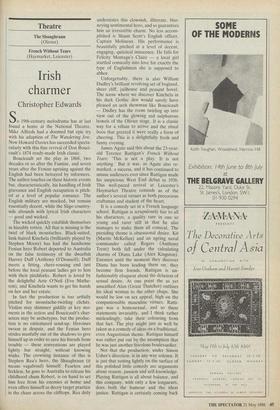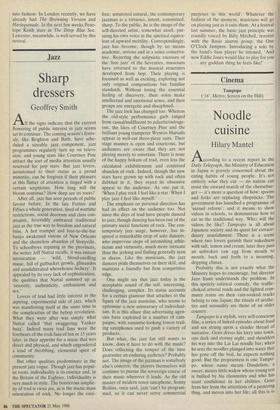Theatre
The Shaughraun (Olivier) French Without Tears (Haymarket, Leicester)
Irish charmer
Christopher Edwards
So 19th-century melodrama has at last found a home at the National Theatre. Mike Alfreds had a doomed but epic try with his adaption of The Wandering Jew. Now Howard Davies has succeeded specta- cularly with this fine revival of Don Bouci- cault's 1874 ready-made Irish classic.
Boucicault set the play in 1868, two decades or so after the Famine, and seven years after the Fenian uprising against the English had been betrayed by informers. The author touches on these historic events but, characteristically, his handling of Irish grievance and English occupation is pitch- ed at a level of popular romance. The English military are mocked, but remain essentially decent, while the Sligo country- side abounds with lyrical Irish characters — good and wicked.
The wicked quickly establish themselves as hissably rotten. All that is missing is the twirl of black moustaches. Black-suited, lank-haired Kinchela (brilliantly played by Stephen Moore) has had the handsome Fenian hero Robert deported to Australia on the false testimony of the dwarfish Harvey Duff (Anthony O'Donnell); Duff meets a fitting, cheer-rousing end just before the local peasant ladies get to him with their pitchforks. Robert is loved by the delightful Arte O'Neil (Eve Mathe- son), and Kinchela wants to get his hands on her and her estate.
In fact the production is too artfully pitched for moustache-twirling cliches. Violins may shimmer giddily at key mo- ments in the action and Boucicault's char- acters may be archetypes, but the produc- tion is no caricatured send-up. Heroines swoon in despair, and the Fenian hero strides manfully out of the shadows to give himself up in order to save his friends from trouble — these conventions are played lightly but straight, without knowing winks. The crowning instance of this is Stephen Rea's hero, the Shaughraun (it means vagabond) himself. Fearless and feckless, he goes to Australia to release his childhood chum Robert, is on hand to set him free from his enemies at home and even offers himself as decoy target practice in the chase across the clifftops. Rea drily understates this clownish, illiterate, blar- neying sentimental hero, and so guarantees him an irresistible charm. No less accom- plished is Shaun Scott's English officer, Captain Molineux. His performance is beautifully pitched at a level of decent. engaging, quizzical innocence. He falls for Felicity Montagu's Claire — a local girl startled comically into love for exactly the type of Englishman she is supposed to abhor.
Unforgettably, there is also William Dudley's brilliant revolving set of bogland, sheer cliff, jailhouse and peasant hovel. The scene where we discover Kinchela in his dark Gothic den would surely have pleased an arch showman like Boucicault — Dudley has the room twirling up into view out of the glowing red sulphurous bowels of the Olivier stage. It is a classic way for a villain to arrive and the ritual boos that greeted it were really a form of cheering. This is a delightfully fresh and funny evening.
James Agate said this about the 23-year- old Terence Rattigan's French Without Tears: 'This is not a play. It is not anything.' But it was, as Agate also re- marked, a success, and it has continued to amuse audiences ever since Rattigan made his auspicious West End debut in 1936. This well-paced revival at Leicester's Haymarket Theatre reminds us of the author's several virtues as both precocious craftsman and student of the heart.
It is a comedy set in a French language school. Rattigan is scrupulously fair to all his characters, a quality rare in one so young and rarer still in that he also manages to make them all comical. The presiding theme is obsessional desire. Kit (Martin McKellan) and an ageing naval commander called Rogers (Anthony Trent) both fall under the calculating charms of Diana Lake (Alex Kingston). Enemies until the moment they discover Diana has been leading them on, they become firm friends. Rattigan is un- fashionably eloquent about the delusion of sexual desire. At one point the as yet unscathed Alan (Grant Thatcher) outlines his ideal woman to the other chaps. She would be low on sex appeal, high on the companionable masculine virtues. Ratti- gan was a homosexual, and so these statements invariably, and I think rather misleadingly, take their colouring from that fact. The play might just as well be taken as a comedy of ideas on a traditional, even Augustinian theme. Rattigan himself was rather put out by the assumption that he was just another frivolous boulevardier.
Not that the production, under Simon Usher's direction, is in any way solemn. It is just that resting lightly on the surface of this polished little comedy are arguments about reason, passion and self-knowledge. Playing Rattigan is all about balance, and this company, with only a few longueurs, does both the humour and the ideas justice. Rattigan is certainly coming back
into fashion. In London recently, we have already had The Browning Version and Harlequinade. In the next few weeks Pene- lope Keith stars in The Deep Blue Sea. Leicester, meanwhile, is well served by this revival.































































 Previous page
Previous page